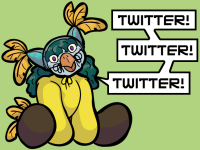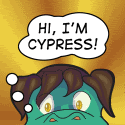The Secret to Making People Actually READ your Webcomic.
 You asked for it -- or at least searched for it! Since so many folk are (at least according to Google) searching for how to get people to read webcomics, who am I to argue? (Especially since writing articles based around webcomics is far more enjoyable than just writing about bloggers, no matter how similar they seem.)
You asked for it -- or at least searched for it! Since so many folk are (at least according to Google) searching for how to get people to read webcomics, who am I to argue? (Especially since writing articles based around webcomics is far more enjoyable than just writing about bloggers, no matter how similar they seem.)There's a lot of different things people like in webcomics, if only because there are so many different types of webcomics. Make sure you at least have the basics down, though:
- Consistent Updates.
New readers may be hooked, but if your comic's not updated regularly (or worse, defunct), they won't know when to return to get more. Quantity is one thing, but a properly addicted reader will want their regular fix. - Some way to explain 'gaps' and inconsistencies.
Confused readers don't read further. This can be countered with an especially large archive, as people start to see that the quality of the story and the art improves, but when you're starting out, the best way to counter this is with Archive Enhancements like cast pages, artist's commentary (especially on early pages), and even frequently asked questions. - Enough archive to get them hooked.
The minimum archive you need depends on the story you're trying to tell -- and admittedly in my case, is something that needs to be worked on pronto. 20-30 pages is sort of a bare minimum, and it's only when you start getting into the hundreds of pages that you have enough pages to be immersible. (and yes, I know Last Resort isn't there yet. It should be pretty close by the end of the year though.) - Forums (or at least some clue they're not shouting into the void)
Again, don't do this until you have something resembling a following already, but even a pair of die-hard fans can be enough to start a following. People attract more people, simply put. - A halfway decent comic to begin with.
Don't think good writing makes up for bad art, or vice versa. If you're not putting whatever effort you've got into this, it's not going to make up for itself, no matter how many strips, cast pages, or whatever else you've got. Yes, good writing can counter minimalist art. Not bad, minimalist. If you don't know the difference, your writing's not going to be good enough to make a difference.
Of course, these are only the basics... you'll want to subscribe to the rss feed to make sure you don't miss all the good tips that have to follow after this. Or maybe you want to go ahead and tell me if I missed one I need to include for later?
Labels: advertising, audience, better branding series, comics, design, starting out, updates






